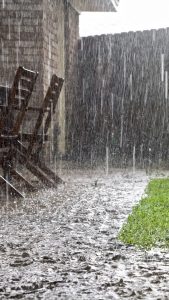With the climate crisis escalating and evidence of ecological breakdown all around us, it’s time to get serious about gardening’s restorative potential.
What if gardening stopped being fun – and became serious fun? Emergencies are skidding at us from around every corner: social, political, economic, ecological… the list grows as we face crises near and far, in addition to the all-encompassing one: climate breakdown.

In any crisis, we have to act, and act fast. What’s bewildering about how we’re responding to our series of cataclysms is how unserious we seem about many of them, and how deflection, obfuscation and delay now fawn at the altar of inaction: denial.
In July we saw wildfires burn out people’s homes and turn their gardens to ash, on the heels of temperatures that – according to scientific evaluation – we shouldn’t even experience. August’s heatwave has turbo-charged a drought never before experienced by millions, which is crisping parts of Britain to lifeless brown. Our social and economic infrastructure is creaking.
We live in baffling, bemusing times, amid a realisation that some things will only get worse – so it’s easy to slump into powerlessness when trying to juggle all of the bad stuff going on. But we gardeners – millions of us – are, together, like a snoozing giant in the emergency response department; we’ve barely scratched our collective powerfulness.
Whenever water supplies run low and hosepipe bans are mooted, gardening gets its moment in the headlines. A slew of media stories pop up, telling us how to save water; to mulch, mulch, mulch; to plant this and that; to not water a brown lawn; to up our butt count… the same tedium, on repeat.

Listen carefully, and you’ll notice that whenever gardening is included in any wider discussion about water shortages (or any other ecological emergency), the tone of the conversation switches, without fail, from sober and serious to fluffy and light-hearted. Tune in to most conversations daring to link how what we do in our gardens might affect – for good or ill – our wider world, and you’ll hear seriousness derailed, often deliberately, by flippancy. It’s almost as if gardening is dismissed as some kind of clownish comedy act when it comes to facing down our unfolding emergencies; just a bit of flowery fun. Let’s humour gardeners, then move on to the really serious stuff.
Sowing frivolity into exchanges that bring gardening and concern for our living world together has its uses: the one thing big business doesn’t want is for gardeners to start thinking too seriously and risk making uncomfortable connections. Best to keep it light, trivial, safe. It works a treat (alongside misinformation and lies) in the vacuous ‘debate’ around ending the use of climate-wrecking peat-based composts. Chill – it’s only gardening! But chilling, and taking things seriously in an overheating, disrupted world, are not mutually exclusive. Some serious gardening fun is just what the climate ordered.
Let’s chill with water, and the problems flowing from too much or too little of it. When was the last time you heard a discussion about ‘rain gardens’? Designed to capture and hold rainwater that falls on our roofs, drives and other hard, impermeable surfaces, rain gardens (there are books on them) help to divert water away from increasingly overwhelmed drains and sewers, preventing the kind of flash floods we increasingly see in urban areas.

At its simplest, a rain garden is designed to channel, slow and direct rainwater to a low-lying spot in a garden, either naturally occurring or created. The area can be thoughtfully planted; in higher rainfall areas, bog gardens will thrive.
It’s fun planning and designing a simple rain garden – even if all you do is scoop out a deep, wide hollow in your lawn and then adapt downpipes so that rainwater flows straight to it. The rain rerouted away from drains percolates into the soil, helping to replenish valuable groundwater supplies, which help to keep our gardens going during a drought.
But wouldn’t it be something if we took the role of our gardens in mitigating extreme weather events more seriously; imagine if boffins researched where rain gardens would bring the most tangible benefits. If we got really serious, we might even decide it was worth encouraging gardeners in flood-prone areas to install rain gardens, by giving them a grant toward the costs of removing soil-smothering paving, decking and polluting plastic ‘grass’. And if local garden centres had demonstration rain gardens, while offering the expertise to install and plant them up, incorporating suitable insect-boosting plants, we’d be in dead serious gardening territory.

Insect numbers are crashing, especially in intensively farmed landscapes. We know that networks of urban gardens provide rich, diverse habitat for insects and much other wildlife, where they can breed and seek sanctuary from pesticides and pollution. But what if we got serious about supporting those insects? What if we (more boffins) could work out the optimal zones in our urban areas (where most of our gardens and allotments are), and urge gardeners there to plant like billy-o to support insects, including vital wild pollinators?
Those zones would likely fringe our conurbations, forming a living, flower-filled loop that boosted insect life inside it – our own gardens – while offering a pollen- and nectar-rich linear pit-stop for insects struggling to forage in surrounding, polluted farmland, devoid of flowers. These ‘flower fringes’ could play a seriously useful role in helping to reverse insect decline, especially if we devised some seriously well-researched lists of the top plants to grow for non-stop, season-spanning blooms. Swallows and swifts would swoop happily overhead. Back that up with ‘Buzz Teams’ offering garden-to-garden advice on how to grow fringe flowers, and we’re talking serious emergency response.
Growing flowers for the fringes would involve greenhouses warmed by free and renewable modern sunshine being used to raise bee-boosting blooms, from home-saved seeds, in locally sourced peat-free compost. They’d be planted by neighbourhood ‘fringers’, working and laughing together – their worries, bafflement and bemusement ousted, at least for a while, by some serious gardening fun.
Text and images © John Walker. Rain image: Depositphotos
Find John on Twitter @earthFgardener










